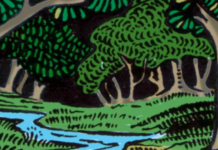 Vodou Shaman: The Haitian Way of Healing and Power, by Ross Heaven
Vodou Shaman: The Haitian Way of Healing and Power, by Ross Heaven
Destiny Books, 270 pp. (+ appendix, notes & index),2003
The author is one of a small, but growing, number of cross-cultural initiates who are willing to take the time, effort and expense to explore the little-understood “primitive” system of religious/magickal thinking known as Vodou (aka Voodoo, Vodoun, Vodun, etc.). Too many people have gotten their knowledge of this religion from Hollywood “B” movies, novels, and tabloid newspapers. It has been all too easy to dismiss it based on such sources.
Mr. Heaven decided to make an effort to explain Vodou from the inside without making an effort to convert his readers. Although he includes numerous exercises to help one begin to experience the connection with the ancestors and loa, he avoids trying to convince anyone that Vodou is the “one, true, and only way to approach divinity.
Vodou, like most “native” religions is not one of theological thought and dogma. It is a system of shamanic principles which must be experienced by each individual personally. There is no “right” way things must be done. There are traditional methods which have been found to work, but there is no central authority to oversee and enforce them.
If you are expecting pages filled with blood-soaked sacrifices, frenzied orgies, and soulless zombies, you will need to check out the novels of Dennis Wheatley, go to video store and rent on of those “B” movies, or pick up a tabloid newspaper. If you are hoping to read this book and be able to call yourself a Houngan or Mambo, you are in for disappointment. While this book can give you a feel for the religion, only personal training by and experienced Houngan or Mambo can make you a member of this growing religion.
Do not expect to rush through the exercises contained within these covers. The more time you allow yourself to experience the spiritual stretching and growth, the better the results achieved, and the more beneficial the outcome.
Like many religions, Vodou suffers from what “everyone knows” about it. If you are a practicing Pagan or Witch, hopefully you will gotten past this stage (although I know far too many Pagans who refuse to associate with groups that “everyone knows” work evil magick, use sacrifice in their worship, or “walk the Left-hand Path.”). Regardless what religious background you have, it is important to hold an open mind as you read this book.
To tell a story, on myself, I have to admit that my first reaction upon seeing this book in my shipment was “I didn’t order this title, so I probably won’t review it.” This in spite of the fact that I have received my elekes and Warriors in the Lucumi faith. After all, I wasn’t interested in reading about Vodou at this point. I had read about it extensively in the past and didn’t see the need to read any more on this topic.
I’m glad I didn’t hold to that opinion. This book offers a truly unique point of view, one which has been missing here in the Western world. If you have absolutely no desire to learn about Vodou, if the idea frightens you or disgusts you, if you feel there is nothing to learn from such a religion – you need to read this book. Balance is important in all things, and until you know both sides of the story, you cannot achieve such a balance.
If you live in the U.S., in one of the Southern states especially; if you live in the Caribbean; if you have friends within that community, read this book so that you can relate more fairly to followers of Vodou.
The method of conveying the information in this book is highly effective for the Western reader. I don’t know if it would be as effective for a member of a Afro-Caribbean culture, since there is a difference in how we experience and react to information. We in the West tend to think about the information we receive, whereas other cultures experience the information. We tend to be more cerebral, others tend to be more experiential. Both systems work, and neither is “better.” They are merely different.
It is necessary to make to information and experiences in this book part of yourself if you are to know the reality of Vodou.
This is, without a doubt, the most honest portrayal of an initiation I have read in many years. It doesn’t betray any secrets – it can’t. The “secrets” must be experienced, they cannot be conveyed by words.
In addition to all the above, there is much valuable information about healing, both for others and for oneself. The author’s background in the field of psychology shows, and allows him to present information in a way which is more palatable to those raised in Western, “logical”, ways of thought.
This book will open many pathways for you, and is well worth the investment of time and energy it requires.








